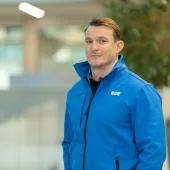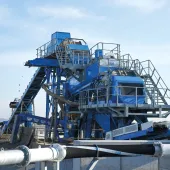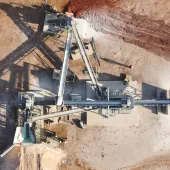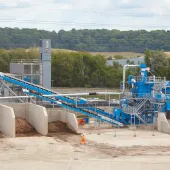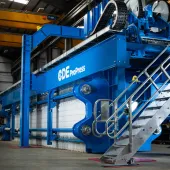Second CDE silica sand plant for SOMEVAM

First published in the August 2021 issue of Quarry Management
Subsidiary of Tunisian Sebri Group leads North African glass sand market thanks to CDE solution
SOMEVAM, a subsidiary of the Tunisian Sebri Group, an independent, family owned and operated group with interests in quarrying, have operated sand quarries in Oueslatia, Tunisia, since 2001, serving the country’s construction market.
But, following testing of their raw material, SOMEVAM saw the opportunity to diversify into the glass industry in North Africa and Europe with the production of a range of supplementary products, including industrial sand and silica flour. The company also wanted to produce a 30–150-micron fraction that would make its offer unique in the region. To this end, in 2019 SOMEVAM invested in an effective wet processing solution that would eliminate contaminants and offer variable cut points to increase the quality and commercial value of their end products.
Each day, SOMEVAM extract c.3,000 tonnes of sand. To handle such quantities efficiently while also adhering to stringent quality standards requires the most advanced, durable and sustainable processing equipment. Working together, SOMEVAM and CDE developed a tailor-made wet processing solution to help the Tunisian company to achieve its commercial growth aspirations. The design process, underpinned by CDE’s co-creation approach, allowed CDE engineers to work directly with the SOMEVAM team to develop a modular wet processing installation perfectly suited to the nature of the feed material (including a silica content of 99%) and the company’s production targets.
Habib Sebri, chief executive officer of SOMEVAM, explained: ‘Before we got into glass sand, we operated the Oueslatia site to produce building materials. However, it was clear that the material on site presented an interesting commercial opportunity in the field of silica sand for flat-glass applications, such as windows, mirrors and flat glazing.
‘It was important to invest in the right sand-treatment equipment to guarantee the success of the project, and after exhaustive research of the various options at our disposal, we chose a modular wet processing solution from CDE. The expertise of the company’s engineers and sales team, its investment in innovation and new technologies, and the quality of the materials used during the manufacturing process were the key determining factors in our decision.’
The CDE solution
To guarantee precise control of sand cut points, SOMEVAM opted for a complete turnkey CDE solution. The CDE plant has the capacity to treat up to 200 tonnes/h, producing 100 tonnes/h of silica glass sand for the glass industry, as well as a range of secondary products including fine silica sand for silica flour production, foundry sand, concrete sand, and road base.
The installation features a synergistic combination of CDE equipment including an M4500 primary wash plant, five high-frequency Infinity screens, four attrition cells, spiral separators, a CDE counter-flow classification unit (CFCU), a nano-cyclone, magnet, four EvoWash sand washing units and an AquaCycle water-management solution. In combination, the system processes fine and coarse materials and eliminates contaminants to produce high-specification glass sand.
Compact, powerful, easy to use and economical, CDE’s high-tech M4500 plant has proven popular and been installed in many plants around the world since its launch in 2014. CDE’s cyclone technology uses centrifugal force for classifying materials rather than gravity, which retains every grain of viable sand in the system. The design of the cyclone also makes it possible to establish several variable parameters to obtain superior cut-point precision. Attrition, spiral and magnetic separation processes are used to remove contaminates from the product and maximize the silica content.
Bassem Idriss, project manager for the Europe and MENA region at CDE, explained: ‘The M4500 demonstrates the effectiveness of CDE’s cyclone technology and the flexibility of our process and engineering teams, who have designed the process to produce very-high-quality glass sand to meet SOMEVAM’s requirements.
‘The hydrocyclones were built according to the specific needs of the client, based on analysis of the feed material carried out by CDE during the pre-project phase. The process water, loaded with undesirable fines, is removed at the level of the overflow of the cyclones, while the treated sand enters the dewatering and stockpiling phase. With cutting points of incomparable precision, the products are treated according to the required standards and without risk of mixing.’
To produce a very clean sand product requires a very good supply of clean water. Therefore, the CDE installation incorporates a cutting-edge water-management system, the AquaCycle thickener, with a capacity of 1,500m3/h. Wastewater from the plant is processed by the AquaCycle thickener, which recovers up to 90% of the process water for recirculation back into the washing plant, minimizing the size and maintenance requirements of the settling ponds, which is particularly advantageous given the location of the site in Tunisia.
Mr Idriss continued: ‘In Tunisia, a hot and dry country, it is important to consider the difficulties of accessing fresh water. It is essential not to waste a drop. CDE’s AquaCycle allows SOMEVAM to recycle process water in a closed circuit for immediate reuse in the system.
‘The wastewater, after passing through the de-aeration chamber and after having been in contact with the flocculant injection, passes to the centre of the AquaCycle so that the flocculation process operates and acts on the sedimentation of the fines. The integrated flocculation unit allows precise dosing of pre-mixed flocculant for effective decantation. A single motor drives the AquaCycle rake arms for optimal sludge treatment before disposal.’
The result
The 2019 CDE installation for SOMEVAM transforms the feed material into five high-specification products that are of great commercial value. It produces glass sand (150–650 microns) and related products, including oversized (3mm) ready for use in water-filtration systems; coarse sand (650 microns to 3mm) ready to be ground to make silica flour; ultrafine sand (30–150 microns) for ceramics or other industries; and iron-rich sand that can be used on sports fields. With a typical moisture content of 12%, the materials are market-ready straight from the belts.
Habib Sebri commented: ‘Our CDE solution has made a huge impact on the glass sand industry in Tunisia and in the North African market. It represents the most advanced technology available in the North African market and has enabled us to become ultra-competitive in an industry with extremely high-quality standards.
‘Our glass sand is sold for the production of white glass, and the other fractions are sold for various industrial applications. Our quick return on investment was thanks to the power and efficiency of our CDE solution. We have succeeded in expanding our offering and have positioned ourselves in new markets, which has strengthened SOMEVAM’s reputation for quality and consistency of service.’
Second sand plant
Earlier this year SOMEVAM announced plans for a significant investment in the development of their second CDE wet processing solution in Oueslatia, to meet growing demand for their glass sands. The glass industry currently accounts for more than a third of the total market for silica sand, based on end use, and market analysis projects a growth rate of 7.12% in the silica sand market over the forecast period 2019–2026, reaching US$3 billion by 2026.
Commenting on SOMEVAM’s latest announcement, Bassem Idriss said: ‘We’re very pleased to once again partner with Sebri Group on this exciting project to significantly expand SOMEVAM’s silica sand processing and production capacity. Their previous investment in CDE technology exemplifies our commitment to engineering excellence and is one of the most advanced plants of its kind.
‘Sebri Group recognize that superior product to meet the demands of the market requires an equally superior processing solution and, as such, this investment will complement their existing CDE solution in Oueslatia to further strengthen their position and capitalize on growth opportunities in the glass sands market.’
Ruchin Garg, CDE’s regional manager for the Middle East and Africa, added: ‘SOMEVAM’s existing silica sand plant, which was commissioned in 2019, receives expert proactive and preventative maintenance and support. It’s this commitment to our customers – one that ensures their CDE solution is running at optimum efficiency to maximize product throughput, yield and profitability, while minimizing their environmental footprint – that has formed the foundation from which we can continue to build upon our positive relationship with Sebri Group.’
Habib Sebri concluded: ‘Following a hugely successful venture into the glass sand industry with our first CDE plant, we sought an additional plant to meet the growing demand for our products. We are excited to partner with CDE once again on this new project to maintain the quality and consistency of our offering.’
- Subscribe to Quarry Management, the monthly journal for the mineral products industry, to read articles before they appear on Agg-Net.com



